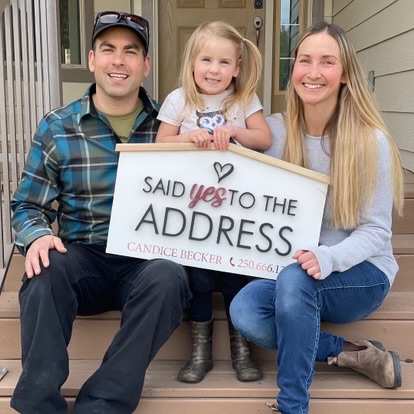#BuyWithBecker

Why Buy with a Local Real Estate Agent?
Buying a property with a local real estate agent can be beneficial as they have knowledge of the local market and can provide valuable insights about the neighborhood, property values, and potential issues. They also have access to exclusive listings and can negotiate on your behalf to get you the best deal possible. Additionally, they can guide you through the entire buying process and provide recommendations for other professionals such as home inspectors and mortgage lenders. Buying or selling a home is likely the largest and most important transaction you’ll ever make – It’s important that you can have all the local knowledge possible, before buying in a new area!
#BuyWithBecker
Let's Get Started

Buying a New Home
You’re starting to think about becoming a homeowner and you likely have lots of questions about how to buy a home in Canada, from the overarching How do you buy a home, to specific queries around financing, home type and location, to how to make and negotiate an offer. To help simplify what can be a complicated process, we’ve outlined how to buy a home in 10 steps.
1. Choose a real estate agent that’s right for you. A home is a huge investment, so work with a realtor that’s knowledgeable, professional and responsive. Treat your search for the right agent like a job interview. Meet with a few different agents, ask lots of questions and check references.
2. Know your budget. As you already know, buying a home is going to be expensive. Knowing exactly how much it will cost and how much you can spend is a crucial step in making a wise investment. Consider your lifestyle, your income and any current debts you’re carrying. Are you secure in your employment? Are you planning any major life changes in the near future, such as a job change or growing your family? Be mindful of the financial impacts this could have.
3. Explore mortgage options and get pre-approved. A mortgage pre-approval informs you of how much your lender is willing to lend you based on a number of factors, such as your credit rating, income and debts. The lender also guarantees the current interest rate for up to 120 days (time may vary depending on the lender), giving you the freedom to house hunt, knowing that you’re safe from interest rate increases. If rates drop, so too should your guaranteed rate. In addition to the interest rate, be sure to also take into account the terms of the mortgage.
4. Start home hunting. Admittedly, this step that has many sub-steps, but let’s narrow it down a bit. While the old adage of “location, location, location” still stands when it comes to good real estate investments, the recent trend of remote workplaces has given people greater flexibility when it comes to answering that all-important question of “where?” Then comes the what: what type of home do you need to accommodate how you and your family live? Condominiums, townhomes and freehold homes each offer distinct benefits, so ensure you’re choosing something that will work for you for the next five years. Have your agent add you to a Private Client Service, to receive listings that meet your criteria when they hit the market.
5. Schedule showings. Did you know your agent can show homes in-person or virtually? Virtual showings have been around for some time, often used for purchases by buyers from overseas, however it has picked-up speed with local buyers too, due to the Coronavirus pandemic. Regardless of how you choose to view the listings, keep your eyes on the prize. Remember your budget and the must-haves outlined in step #4 above.
6. Make an offer. You’ve found the home you want, in a location you like. Now, to make an offer to purchase for a price and terms that are agreeable to both you and the seller. Here’s where working with an experienced realtor can give you the upper hand. Different market conditions require a different approach – a seller’s market might mean lots of competition, requiring you to come in at or over asking price with few to no conditions, while a buyer’s market means you have choice and time is on your side. Lean on your agent on how to best handle the situation.
7. Get a home inspection. Regardless of the market, this is one condition that we recommend you keep as part of your offer. The home inspection is intended to identify any existing or potential underlying problems in a home, alerting the buyer of risks and giving them leverage in negotiating a reduced selling price. Your home inspector will examine systems that are visible without opening walls or floors, including heating, plumbing, electrical, roofing and foundation. The inspection should take approximately three hours and will cost a few hundred dollars, depending on the size of the home.
8. Close the deal. The closing period for your transaction is typically 90 days, however it can range depending on the agreed upon terms in the Agreement of Purchase and Sale. The homebuyer has some important obligations during this waiting period. Once the offer has been accepted, there’s a window during which you must take all the necessary steps with regard to your offer conditions, such as financing, home inspection and anything else that needs to happen before you officially seal the deal. Your mortgage lender will need a copy of the offer to ensure it’s in-line with your pre-approved level of financing. After any adjustments or repairs have been done to your satisfaction, your Realtor will finalize the deal and your lawyer will process the paperwork, including the mortgage documents with your lender. All of this will point to a final date of actual legal possession: the real closing day.
9. Update utilities, transfer services and change-of-address. During your closing period, keep track of utility and credit card bills, magazine subscriptions and any other regular mail or standing orders that you receive at your current address. Alert them of the address change in advance of your closing date. Also be sure to contact your doctor and dentist. For family and friends, you can easily send a change of address card via mail or email, but there are a few more steps when it comes to informing government agencies.
- Change your address with the Canada Revenue Agency
- Contact your local Ministry of Health and Ministry of Transportation to find out how to change your address on your health card and driver’s license.
- Forward mail to your new address by visiting the Canada Post website or at your local post office.
- If applicable, it is important to change your address for the Employment Insurance program that you can easily do here.
10. Move into your new home! If you’re moving during the busy season (typically summer) ensure you’ve booked a moving company well in advance. If you’re doing it yourself, book the truck, enlist some help and ensure you have ample packing materials. Here are some packing tips:
- Pack the items you will need first in a clear plastic bin
- Pack your plates vertically so they are less likely to break
- Take a photo of how you electronics are connected so you can know where the wires go
- Wrap your breakables in clothing to save on bubble wrap
- Keep your glassware safe by packing it with clean socks
We hope this home buying checklist helps. If you still have questions about how to buy a home, or you’re ready to start the process, tap into the knowledge and experience of a local Real Estate Agent, who will guide you through the process every step of the way.

First-Time Homebuyers
Buying your first home can be a daunting experience. For many, the real estate world is complex and confusing, and it’s tough to know where to start when you’re ready to search for your first home. We reached out to our RE/MAX Influencers—a panel consisting of RE/MAX Sales Associates from throughout Canada—to discover their Top 5 Tips for first-time homebuyers.
1. Pre-approval, pre-approval, pre-approval
Agents, clients, Buyers, Sellers, Bankers, neighbours and influencers all agreed that pre-approval is the most important thing for first-time homebuyers to think about so they understand what they can afford. Having this knowledge will make the entire homebuying experience easier and less stressful. It is also important to incorporate closing costs into the equation, and don’t forget about strata fees, if applicable.
2. Make a list and check it (more than) twice
It’s a good idea to write down a list of the things that are important to you when it comes to your first house. Separate the list into two columns: “must-haves” and “would-be-nice.” The list will come in handy when viewing homes, especially if a particular property shows well, but doesn’t have the things that matter most to you. When viewing homes, keep notes so you can remember what features each property had.
3. Keep an open mind
It’s rare for a first home to be a 10/10 in all categories; however, it’s quite possible to find a home you fall in love with, which is also one that checks most of the things off your wish list.
In fast-paced markets where multiple offers are the norm, it’s possible that you may miss out on the first home you’re drawn to. It’s important to remember that the right home for you is still out there, and in some cases, you’ll be relieved you missed out on an earlier home if you eventually find something better.
4. Ask questions
A good real estate agent will always take the time to answer all your questions; a great real estate agent will anticipate the questions you’re going to ask and provide you with the information before you even request it. Many first-time buyers are hesitant to ask questions because they don’t want to be embarrassed if they’re not familiar with certain terminology. Professional real estate agents understand the confusing nature of the business, and are happy to help navigate you through the process.
5. Go with those who know
For many, buying a first home is uncharted territory; therefore, it’s incredibly important that you are represented by a professional agent with a good track record.
It’s also important that your real estate agent is very knowledgeable in the market you’re planning on buying in. Some agents even specialize in working with first-time homebuyers; therefore, be sure to research an agent who is the right fit for you, and who has the time to guide you through the process from start to finish.

